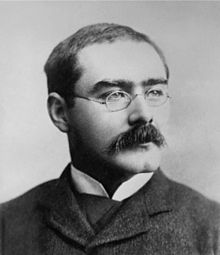  |
| Rudyard Kipling Joseph Smith, Jr. (1865-1936) (1805-1844) |
Of this period in his life, he later said: "I have known a certain amount of bullying, but this was calculated torture." Yet in spite of adversity, his brilliance and fortitude held sway. His precociousness and skill as a writer caused his fame to spread with such rapidity as to recall shadows of the great English poet Lord Byron. It was Byron who quipped: "Adversity is the first path to truth". Surely these words were not lost to Rudyard when he composed If in 1895. It has been voted to be Britain's favorite poem and captures the spirit of Victorian stoicism and that "stiff upper lip" that the British are so renowned for.
Yet in Kipling's story, I am reminded of the youth of Joseph Smith, Jr. when he experienced adversity and persecution on a unprecedented scale. Himself extremely precocious, he also wrote about his persecutions:
I continued to pursue my common vocations in life until the twenty-first of September, one thousand eight hundred and twenty-three, all the time suffering severe persecution at the hands of all classes of men, both religious and irreligious, because I continued to affirm that I had seen a vision. During the space of time which intervened between the time I had the vision and the year eighteen hundred and twenty-three—having been forbidden to join any of the religious sects of the day, and being of very tender years, and persecuted by those who ought to have been my friends and to have treated me kindly, and if they supposed me to be deluded to have endeavored in a proper and affectionate manner to have reclaimed me. (Joseph Smith History 1:27-28, emphasis mine)Like Kipling, Joseph Smith was a boy when his persecutions began. Unlike Kipling, this persecution intensified with each passing year and ultimately cost him his life. Joseph Smith's life was one of continuous adversity as he progressed from an impoverished and ill-educated farm-boy to the great prophet of the Restoration. It was later said of him: "he has done more, save Jesus only, for the salvation of men in this world, than any other man that ever lived in it . . . he lived great, and he died great in the eyes of God and his people" (D&C 135:3). Truly Joseph's ability to rise above and subdue the adversity in his life is formulaic for the kind of valor, stoicism and character that are embodied in Rudyard Kipling's If.
__________________
If
If you can keep your head when all about you
Are losing theirs and blaming it on you;
If you can trust yourself when all men doubt you,
But make allowance for their doubting too:
If you can wait and not be tired by waiting,
Or, being lied about, don't deal in lies,
Or being hated don't give way to hating,
And yet don't look too good, nor talk too wise;
If you can dream---and not make dreams your master;
If you can think---and not make thoughts your aim,
If you can meet with Triumph and Disaster
And treat those two impostors just the same:.
If you can bear to hear the truth you've spoken
Twisted by knaves to make a trap for fools,
Or watch the things you gave your life to, broken,
And stoop and build'em up with worn-out tools;
If you can make one heap of all your winnings
And risk it on one turn of pitch-and-toss,
And lose, and start again at your beginnings,
And never breathe a word about your loss:
If you can force your heart and nerve and sinew
To serve your turn long after they are gone,
And so hold on when there is nothing in you
Except the Will which says to them: "Hold on!"
If you can talk with crowds and keep your virtue,
Or walk with Kings---nor lose the common touch,
If neither foes nor loving friends can hurt you,
If all men count with you, but none too much:
If you can fill the unforgiving minute
With sixty seconds' worth of distance run,
Yours is the Earth and everything that's in it,
And---which is more---you'll be a Man, my son!
Are losing theirs and blaming it on you;
If you can trust yourself when all men doubt you,
But make allowance for their doubting too:
If you can wait and not be tired by waiting,
Or, being lied about, don't deal in lies,
Or being hated don't give way to hating,
And yet don't look too good, nor talk too wise;
If you can dream---and not make dreams your master;
If you can think---and not make thoughts your aim,
If you can meet with Triumph and Disaster
And treat those two impostors just the same:.
If you can bear to hear the truth you've spoken
Twisted by knaves to make a trap for fools,
Or watch the things you gave your life to, broken,
And stoop and build'em up with worn-out tools;
If you can make one heap of all your winnings
And risk it on one turn of pitch-and-toss,
And lose, and start again at your beginnings,
And never breathe a word about your loss:
If you can force your heart and nerve and sinew
To serve your turn long after they are gone,
And so hold on when there is nothing in you
Except the Will which says to them: "Hold on!"
If you can talk with crowds and keep your virtue,
Or walk with Kings---nor lose the common touch,
If neither foes nor loving friends can hurt you,
If all men count with you, but none too much:
If you can fill the unforgiving minute
With sixty seconds' worth of distance run,
Yours is the Earth and everything that's in it,
And---which is more---you'll be a Man, my son!




